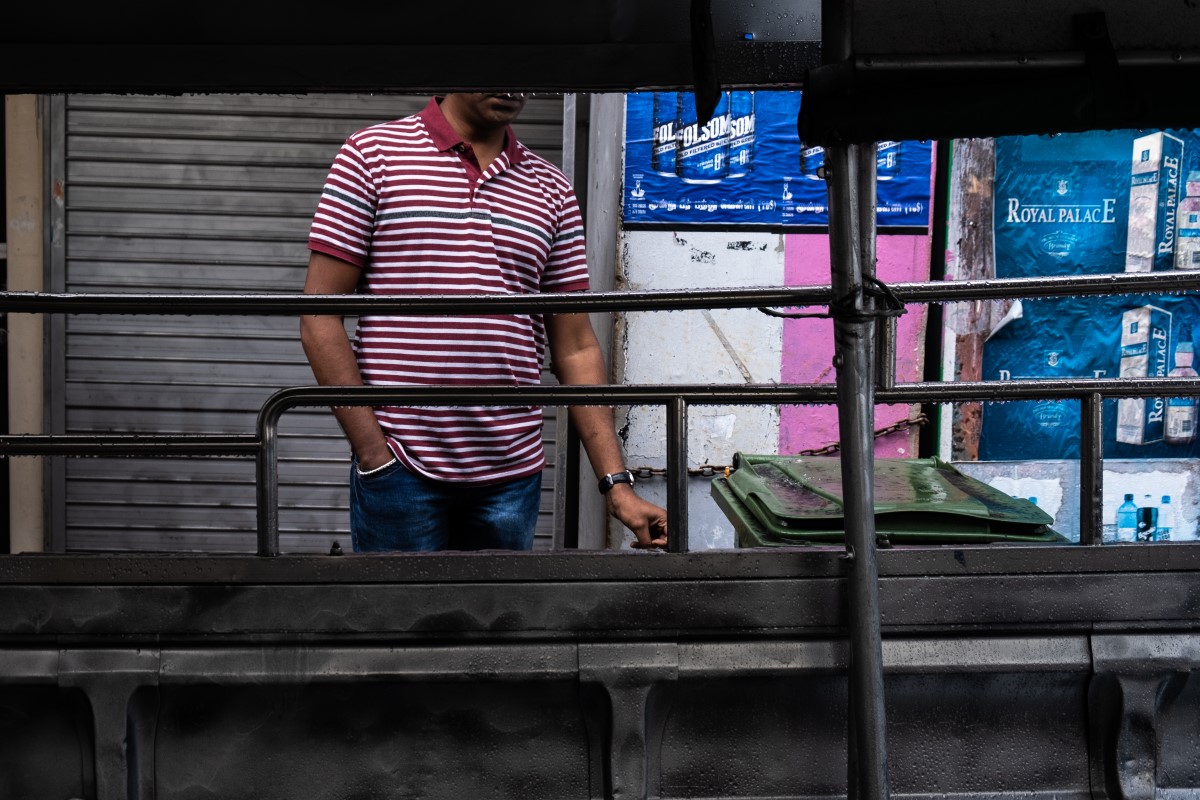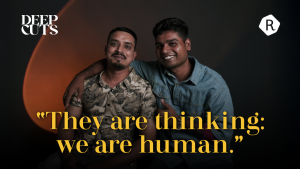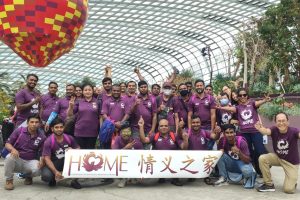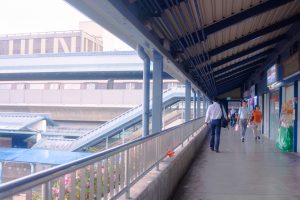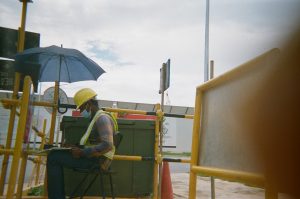Top image: Tey Liang Jin for Rice Media
Rehan’s personal history and legal status were told to the journalist. When the journalist asked to speak with his lawyer and TWC2 officer to confirm details, Rehan rejected for fear of troubling his lawyer, who was in the midst of handling his complex situation. Names have been changed to protect the identity of the interviewee.
Living with COVID came with one aim—“to keep the community as a whole safe”. But recent frustrations among migrant workers at Westlite Jalan Tukang dorm may show that they are still short of being treated as members of the community—however one would define that within the context of Singapore’s increasingly fractured society.
Rehan was once part of that community, one of some 300,000 migrant workers powering Singapore’s construction, manufacturing, and processing sectors. After working in Singapore for a decade and not new to disputes with an employer, Rehan, a 28-year-old Bangladeshi man who dreams of travelling around the world, is still lost in the maze of bureaucracy, written and unwritten rules tacitly imposed on him.
Rehan couldn’t be sure if anyone or everyone he met could decide on his freedom and outcome. His best strategy was to self-censor and keep a distance from antagonizing anyone who could flip his chances.
Reopening
In August 2020, after a four-month lockdown, Rehan could finally leave his dormitory—one of the first few to be cleared of Covid-19 cases. Even though MOM had been paying wages during the lockdown, resuming work came with certain job security that Rehan needed to repay his loans.
A few days after resuming work, Rehan fell from a ladder, hurting his lower back and shoulder. He was hospitalized and received an MC declaring him unfit for work. The note kept him out of work for thirty-six days, then fifteen days, and then an additional fifteen days, again and again, until his work permit expired in December 2020.
While other migrant workers anticipated more free time outside dormitories, Rehan was excluded from that agency. He needed to ask for special permission if he wanted to leave and go to the recreational centre. Rehan chose not to. He saved all remaining social connections for potential favours he may need for his work-injury compensation.
One of the few places Rehan could seek help was HealthServe, the NGO providing subsidized health services to non-residents. When the pandemic posed challenges beyond health risks, some workers received S$100 financial assistance from either HealthServe or Transient Workers Count Too (TWC2); the latter is a social organisation promoting equitable treatment for migrant workers in Singapore.
Debts piled on
While Rehan recovered from his injury, he had no income save for a S$150 food stipend his employer provided, which he received only after repeated reminders.
“The saddest thing is that I am a foreign worker. I came to Singapore to work for my family. They depend on me, and for the past ten months, I haven’t been able to help them,” Rehan told me in our first call.
Repaying loans has become a common burden for foreign workers in Singapore—a situation that is understandably neither new nor unique to Rehan.
As early as 2011,Rehan scraped together S$8500 to pay for a certification program and an agent in Dhaka to fill a construction job in Singapore. Back then, it was the pragmatic dream he embraced.
The cost didn’t occur to Rehan as an absurd investment in exchange for a menial job. Most migrant workers in Singapore had to take out inordinate loans to be trained and authorized for temporary work here. As the oldest of three children, it was natural for Rehan to take up this opportunity.
In 2012, his first work permit expired, and Rehan had to go home. He still owed more than S$2,000 on his bank loan
Nine years later, alone and anxious in his dorm room, Rehan had to borrow from every friend he knew, both in Bangladesh and Singapore, straining and disorienting relationships in ways he wouldn’t elaborate on. His debt piled on.
In August 2021, Rehan began a new routine. He wakes up to the alarms of his roommates at five in the morning and goes back to sleep only to wake up later at 10 am. He either misses breakfast to save money or downs three Oreos to fill his stomach. To save on dinner costs, he buys lunch from the dorm canteen in the afternoon.
For our calls, Rehan was always available. Otherwise, every day was the same. He tells his concerned family, “I am good here,” never mentioning the times he had to skip meals. “I know that I’m unable to help them, so I’m not feeling good to talk to them.”
“I lost a year in my life,” he later added.
Rehan said that the wait would’ve felt better if he had been allowed to live outside while waiting on compensation. He made the request to TWC2 and the MOM officers stationed at his dormitory. The officers said yes, while TWC2 also offered an alternative living space and free meals provided his employer agreed. His employer didn’t.
“The saddest thing is that I am a foreign worker. I came to Singapore to work for my family. They depend on me, and for the past ten months, I haven’t been able to help them“
First trip out
When he could work, Rehan and his friends were often transported on the back of trucks that rumbled past the workaday sprawl along the suburban expressway, just a few blocks but a world away from densely-built HDBs and urban glass towers. Now, injured and needing to renew his S pass, trips had taken on a hint of luxury; the air-conditioned passenger seat in front was all his.
It was a Monday in February 2021 when the company’s driver was scheduled to send workers to their Rostered Routing Testing (RRT) after Rehan’s planned trip to MOM Service Centre. Whether it’s due to careless scheduling or indolence, the driver told Rehan to take the public transport after a short ride to the nearest MRT station.
Without knowing if that was per pandemic regulations now governing his movements, Rehan willingly took the offer.
“So should I go back by myself later?” Rehan asked.
“Better if you go by yourself,” the driver replied. “So [we] don’t need to tell the company ya?” the two voices overlapped.
“If not have to ask supervisor and then the supervisor will say ask the manager, then the manager says supervisor again.” In a few abridged sentences, the two reached a tacit agreement.
“This is my previous company boss,” Rehan lied to the Indian driver when referencing who I was. Earlier, he said that he would introduce me as his friend, but not as a journalist. This was one of the many steps Rehan took to avoid “trouble”, to circumvent any misstep that would further complicate his muddled situation, or as he simply put, “you know.”
Across to the right of the highway, tacky tapes stretch in a zigzag fashion, closing off Kallang Park to the public. Rehan shifts his gaze back from the patch of green where he used to spend his weekends freely. For this special trip, he changed out of his usual second-hand T-shirts into a blue checkered shirt. His hair was specially gelled, and his beard shaved.
“You know when you ask someone for help, there is a 90 per cent chance of getting rejected,” he said.
Holding a HealthServe EZ-link card with a S$50 value, Rehan initiates a trip to the NGO after a brief administrative procedure at MOM. The bus took him across the river through colourful high-rise HDBs and stopped just steps away from HealthServe. A sign attached to the window of the office doesn’t forebode well: “S$100 makanmoney assistance has stopped until further notice.”
A middle-aged Chinese man greeted Rehan and asked why he was here.
“Since Circuit Breaker, I have been stuck in the dormitory. You know the situation, right?” Rehan implored
Almost word by word, phrase by phrase, Rehan repeated what he had told me in our first call when he mistook me to be an NGO volunteer who he assumed could bring just a little financial assistance.
“For the past ten months, I cannot help my family, though they only depend on me. If my food is five dollars, and one day two times also eat, then 30 days is S$300. Food is not the only thing a person needs, right?”
As his anxiety built, he repeated his speech to make sure the NGO staff understood him.
“Now I’m waiting to finish up my case for my compensation. That’s my little history, sir. Helpless, feeling helpless.” The staff nodded and asked a few questions. “Let’s get lunch first before we talk.”
“90 per cent chance of rejection”
The man led the staff, volunteers, Rehan, and me to a Bangladeshi eatery nearby, where a few South Indian men were waiting outside. The male volunteer from HealthServe pulled out a smart tablet and asked R, “Brother, what’s your FIN number?” As Rehan quickly recited, he promptly recorded the chain of numbers and checked against a list. Then the female volunteer handed Rehan his meal ticket.
Rehan turned back from the glass shelves with plates of curries and spiced southern Indian dishes towards me, “What would you like to have, ma’am?” Immediately, the volunteers stopped him and told him he wasn’t allowed that kind gesture.
After the meal, Rehan indulged in a conversation with the young Chinese volunteer, repeating his “little history.”
“Other workers are facing the same situation,” the young Chinese man said to Rehan to indicate that Rehan wasn’t suffering from anything unique. “It is what it is.” This sentence marked the end of their conversation. The volunteer offered a “nicer” canvas bag and more instant noodle packets, soap, and Oreos.
“You know when you ask for help, there is a 90 per cent chance of getting rejected. You see?”
I asked if the instant noodles could save him some food costs. “I have too many of them already,” he said.
The only other form of immediate help HealthServe could offer was mental health counselling, which Rehan found useless to solve practical, financial problems.
Rehan’s shoulders sank as he plodded down the alley with the beige canvas bag. I offered to buy a drink, and we sat at the coffee shop nearby. Ice cubes clinked in a jingle as Rehan filled the translucent plastic cup, emptying a small can of Red Bull.
“The other lady from HealthServe was really good,” he said after a few sips. “Not the people today?” I asked. “You saw, right?” Rehan scoffed while chewing on an ice cube.
From Rehan’s memory, a petite, young and generous female volunteer sympathized with Rehan’s situation just a month ago, offering more snacks and the S$50 Ez-link card he’s using now for his daily travels. Rehan always talked about her kindness and the WhatsApp messages she sent to check on him. His main goal that day was to meet her—that is, to meet her and receive more substantial help.
After attempting to describe the female volunteer at HealthServe, Rehan found that HealthServe’s communications team managed the WhatsApp chat—it was but yet another hotline. For him, this collective effort meant one less personal connection.
“I want to go to TWC2,” he raises his eyes after staring into his drink for some time. “Do you want to come?” he sat straight, his eyes reflecting the afternoon sun.
“I’ll go if you want to,” I said, trying to minimize any influence my expression or tone would have. He finishes the last sip and puts down the cup. “Let’s go.”
A return that was nowhere in sight
TWC2 was 20 minutes away by bus down Kallang Road, where Rehan had passed earlier that day. The NGO, as we all have learnt over the past year, helps workers with compensation claims from work injury and underpayment.
Rehan could have sought help from TWC2 for his claim, but he didn’t. Free services by an NGO did not sound to Rehan a reliable option to pin his hopes. So he found a lawyer who would take 10 per cent of his final compensation as fees.
Rehan asked if I could wait while he went up to Golden Mile Complex. The staff and volunteers had asked about me earlier, and Rehan was alarmed. “They also thinking that why you go to another person to… you understand me right?” The help he received was never enough to alleviate his problem, but he was thankful and couldn’t afford to be ungrateful.
Unfortunately for him, the TWC2 office was closed earlier that day, preparing for a different event ahead of their Chinese New Year closure.
Over the next month, Rehan would make the same long trip to renew his S-Pass. He takes the bus to HealthServe, gets the free lunch, then heads over to TWC2. But whenever he could walk, he would.
“I like walking,” he said, explaining why he chose to brave the searing sun every other pedestrian was trying to avoid.
However, a month later, things felt different. Rehan’s EZ-link card was running out of value, and a return to Bangladesh was nowhere in sight.
The hometown that Rehan missed was a town resembling Baluchar, featured in CNA’s “The Bangladeshi Town With A Singapore Dream.” Young people in both cities gambled on buying their way into jobs in a wealthier country like Singapore. Most return without building the wealth they had imagined.
The lucky few were those who knew a Singaporean employer willing to hire them directly. Rehan at least was able to find an agent. Others needed to pay an intermediary in Bangladesh just to find an agent.
In 2011, a TWC2 study, “Worse off for working?” found that workers paid an average of S$7256 for their first job in Singapore, 15 times their basic salary.
By 2016, the figure was 36 times more.
Locked down
Over trips with Rehan outside his dorm, he shared how he passed the time during the lockdown. At the beginning of CB last year, Rehan was only four months into his most recent one-year work permit, netting savings far below the amount to recuperate the agent fees he paid for this trip.
His first few months back coincided with the sacred Islamic month of fasting and spiritual cleansing that started on April 23 in 2020, a few weeks after Singapore’s first Circuit Breaker, enacted to curb rising COVID-19 cases back when the strategy was complete eradication. Migrant workers were also under strict instructions to stay in as case numbers in dormitories rose.
Celebrating in a restricted space meant a celebration without a sumptuous spread with loved ones. Rehan recalled praying five times a day and fasting with other men in his room. With nothing to do and nowhere to go, the days became even longer. Movies or phone calls with families back home were still their only options.
“My mother always cries,” Rehan recalled. “My family is in crisis. I am also in crisis.”
“Just come home,” she pleads.
To strangers who comment on Rehan’s social media posts, Singapore was clearly not his home. In reply to Rehan’s post lamenting the bland Chinese food catered to his dormitory, predominantly Bangladeshi, someone wrote, “Bangla, u want top eat ur shit food u go go back ur slum. The government so nice give u free nutritional food also complain. Ungreatful slumdog” (sic).
“I just ignore those,” Rehan said when I asked about disparaging comments after one of his visits to HealthServe. He preferred to stick to complimenting the country that held his fate in its hands. Rehan says Singaporeans are kind and humble, like the people of Japan, another country he hopes to travel to for leisure. He was not letting this incident affect him.
Rehan’s positivity towards Singaporeans was not baseless. Mutual aid and volunteer groups organized to deliver essentials such as masks and food to dormitories. ItsRainingRaincoats (IRR), HealthServe, Covid-19 Migrant Support Coalition (CMSC) have the widest outreach, collaborating with JTC that supervises dormitories.
Singapore’s low Covid-19 death rates in 2020 also testified for the nation’s robust public health system. Those around Rehan, including himself, started to feel that they made the right decision to stay, where they were assured of a resilient healthcare system despite restricted freedom.
Rehan was grateful for the medical attention to his dormitory. “Even if Singapore government no take care of us, we cannot say anything right?”
Rehan’s complex situation
In mid-March this year, more than a month after his first trip out by public transit, Rehan sent me a brief message saying that his case had concluded and we could meet for one last time before his flight. But that morning, his prepaid card ran out of balance, and there was no guarantee that we could meet.
After a long wait outside the MOM Service Center, Rehan appeared from the SafeEntry checkpoint; but his lagging steps and sunken shoulders were not spelling out the long-awaited flight home. He told me that his employer wanted to deduct the S$150 monthly food stipend from his work-injury compensation.
That meant after a prolonged wait, Rehan was going to receive a meagre S$1,600 for the time he was deemed unfit to work, half of what he expected, with no reimbursement for the costs spent waiting.
Dispirited, he embarked on what is now a regular 20-minute bus ride to HealthServe for the free lunch. When the bus passed a durian stall, Rehan said, just as he did in February, “I may be smiling outside, but inside, it’s pain.”
This time, stakes were higher, and Rehan asked if I could wait at the coffee shop while he went to HealthServe. I rejoined him at the restaurant after he finished lunch. Rehan stops the restaurant owner, “Where can I get a cigarette, sir?”
Without a word, the man hands him an orange box of cigarettes. “There’s too much stress on my mind,” he says. “I’m waiting for my air tickets to be confirmed, and then I’ll go to a salon to tidy up myself.”
Whenever Rehan spoke of returning home, he pictured good things happening simultaneously, as if he could have more control over his timeline in the manifestation. At the beginning of March, Rehan wanted to return home by the end of the month. By the beginning of April, he hoped to return before Ramadan with a fresh haircut and trimmed beard. Now, he had no reason to go to a salon to tidy up. He had to wait for his claim to be settled.
“I’m not feeling good. I want to go home.” Rehan paused, “Ramadan is coming.”
Rehan could leave Singapore, have his lawyer settle the case and receive the money in Bangladesh later. But that never crossed his mind as an option. How could he tell his debtors and family that he’s back in Bangladesh empty-handed after all this long wait? Would anyone believe that?
All good outcomes should and need to happen before Ramadan. Spending Ramadan in lockdown last year was hard enough, and a second one would be intolerable. For another two hours that afternoon, Rehan paced back and forth between officers at the ministry and spoke earnestly with his lawyer on the phone.
Unfortunately, the arrival of this year’s Ramadan and Covid-19 case number hikes in Bangladesh outpaced Rehan’s progress. On April 14, Bangladesh imposed a nationwide lockdown, suspending international flights.
“My mind not good much. I can’t fly off this week!” Rehan wrote in a text reply.
Rehan skipped his obligatory prayers, cooked fish curry with ingredients he bought after one of the trips to MOM and ate during the day. “I’m sinning,” he said.
But later in the week, Rehan heard from his lawyer that MOM was giving his employer three days to pay him. He immediately started searching for hotels for the mandatory quarantine in Dhaka. Two weeks of quarantine was going to cost at least half of what he would receive in compensation. Even if he couldn’t pay, Rehan couldn’t stay in Singapore once his employer complied with the order.
On April 24 2021, Rehan’s employer handed him S$2,300 at the airport under the strict watch of a MOM officer. Miraculously, on the same day, the Bangladeshi government cut the quarantine period to three days. To further save on his expenses, Rehan shared a room with another Bangladeshi, each of them paying S$35 for the space.
Now back in Bangladesh, at iftar, Rehan’s sister scoops out a plate of fish biryani, his favourite dish, while his mother prays separately on a broad and flat bed, dressed head to toe in a turquoise satin sari. Rehan waited, pampered like any other eldest son in a Muslim family. He crosses his legs to sit on the woven carpet and smiles.
“Now I feel something good. I can breathe clearly.”

